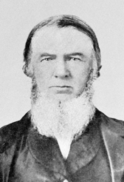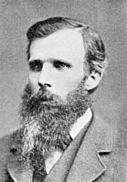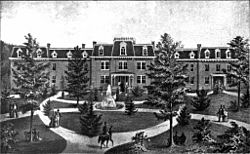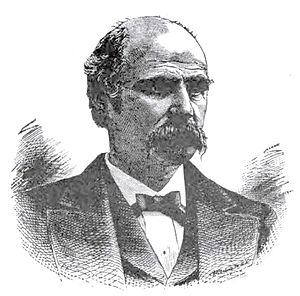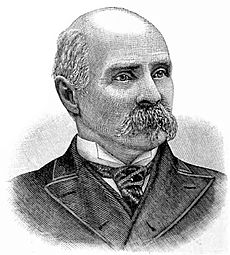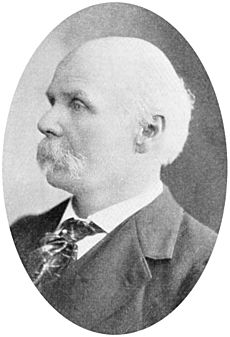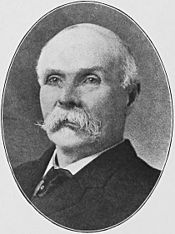Robert White (attorney general) facts for kids
Quick facts for kids
Honorable
Robert White
|
|
|---|---|
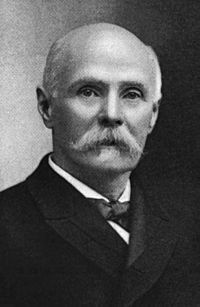
Portrait of Robert White in later life
|
|
| 8th Attorney General of West Virginia | |
| In office 1877–1881 |
|
| Governor | Henry Mason Mathews |
| Preceded by | Henry Mason Mathews |
| Succeeded by | Cornelius Clarkson Watts |
| Personal details | |
| Born | February 7, 1833 Romney, Virginia (now West Virginia), United States |
| Died | December 12, 1915 (aged 82) Wheeling, West Virginia, United States |
| Resting place | Greenwood Cemetery |
| Political party | Democratic Party |
| Spouse | Ellen E. Vass |
| Relations |
|
| Children |
|
| Parents | John Baker White (father) Frances Ann Streit (mother) |
| Residences | Romney, West Virginia; 7 13th Street, 125 14th Street, and Bae Mar Place Wheeling, West Virginia |
| Profession | |
| Military service | |
| Allegiance | |
| Branch/service | |
| Years of service | 1861–65 |
| Rank | Colonel (1864–65) |
| Unit | Company I of the 13th Virginia Volunteer Infantry Regiment (1861–63) |
| Commands | 41st Battalion Virginia Cavalry (1863–64) 23rd Virginia Volunteer Cavalry Regiment (1864–65) |
| Battles/wars | American Civil War |
Robert White (February 7, 1833 – December 12, 1915) was an American military officer, a lawyer, and a politician from West Virginia. He served as the Attorney General of West Virginia from 1877 to 1881. White also served two terms in the West Virginia House of Delegates, representing Ohio County in 1885 and 1891.
Born in 1833 in Romney, Virginia (which is now West Virginia), Robert White was the son of Hampshire County Court Clerk John Baker White. He studied law at Lexington Law School and became a lawyer in 1854.
Before the American Civil War, White became a captain of the Frontier Riflemen. This group later became Company I of the 13th Virginia Volunteer Infantry Regiment. In 1864, he became a colonel leading the 23rd Virginia Volunteer Cavalry Regiment. He served until the unit broke up in April 1865.
After the war, White returned to Romney and worked as a lawyer. He worked hard to help the South Branch Potomac River Valley recover from the war. He helped bring back the Romney Literary Society and helped secure the West Virginia Schools for the Deaf and Blind for Romney. He also started the South Branch Railway Company.
White was elected as West Virginia's attorney general in 1876. He handled important cases, including making railroad companies pay taxes to the state. He also helped get Elihu Gregg extradited from Pennsylvania after Gregg was accused of burning the Preston County courthouse. White also argued for the rights of former Confederate soldiers in the Supreme Court of the United States. After being attorney general, White served in the West Virginia House of Delegates. He later became the city solicitor of Wheeling and a lawyer for the Baltimore and Ohio Railroad Company.
In his later years, White was involved in remembering Confederate soldiers. He was a leader in the United Confederate Veterans and helped build the Confederate Memorial Institute's Battle Abbey in Richmond. He was also a Freemason and a well-known speaker. Robert White died in Wheeling in 1915.
Contents
Early Life and Education
Robert White was born on February 7, 1833, in Romney, Virginia. This area is now part of West Virginia. He was the oldest son of Hampshire County court clerk John Baker White. His mother was Frances Ann Streit White. His grandfather was the famous Virginia judge Robert White. Robert White was likely named after his grandfather.
Robert had three older half-sisters from his father's first marriage. He also had five brothers, including Christian Streit White, and four sisters from his parents' marriage.
White went to local schools, including the Romney Classical Institute. When he was 14, he started working in his father's court office. He worked there for about six years. After learning from his father, White studied law with John White Brockenbrough. He attended Lexington Law School in Lexington.
White became a lawyer on March 30, 1854. He immediately started his law practice in Romney. He became an important lawyer in Hampshire County. Before the American Civil War, he was also a member of the Romney Literary Society.
Confederate Army Service
In 1860, after John Brown's raid on Harpers Ferry, a volunteer military group called the Frontier Riflemen was formed. Robert White became their commanding officer with the rank of captain. When the Civil War began, Governor John Letcher ordered White's group to report to Lieutenant General Stonewall Jackson at Harpers Ferry.
White and his unit arrived at Harpers Ferry on May 18, 1861. His company was then assigned as Company I of the 13th Virginia Volunteer Infantry Regiment. This regiment was led by Colonel A. P. Hill. White's company marched from Harpers Ferry to Winchester. They then returned to Romney in June 1861 and stayed there for several days.
A group under White's command was sent to New Creek. Their mission was to destroy railroad bridges. They successfully burned the bridges. After that, they fought with the Cumberland Home Guards. White's forces won and captured two cannons.
During the winter of 1861–62, White worked in the ordnance department. In 1863, he was allowed to form and lead a cavalry battalion. He formed the 41st Battalion Virginia Cavalry in September 1863. He led this battalion until April 1864. At that time, seven of its companies joined with two others to form the 23rd Virginia Volunteer Cavalry Regiment.
White was then made a colonel and commanded this cavalry regiment. He served in this role until the unit was disbanded in April 1865. White stayed in the Confederate States Army until May 14, 1865. He served well throughout the war and fought in many battles across Virginia.
During the war, White's father, John Baker White, moved to Richmond. He worked for the Confederate States Department of the Treasury. However, his father died soon after arriving in Richmond on October 9, 1862.
Rebuilding Efforts After the War
After the war, White went back to Romney. Since his father had passed away, Robert became the head of his family. He started practicing law again to support them. In 1865, he worked with John Jeremiah Jacob. This partnership lasted until Jacob became Governor of West Virginia in 1871. White then grew his law practice, making it the biggest in the Eastern Panhandle of West Virginia. He continued practicing law until 1877, when he became Attorney General of West Virginia.
White worked hard to help the South Branch Potomac River Valley grow again. This area had been badly damaged during the Civil War. To help rebuild Romney, White first focused on honoring the Confederate soldiers who died. In the spring of 1866, a meeting was held at White's home in Romney. His wife, Ellen E. Vass White, his brother Christian Streit White, and other family members were there.
After this meeting, a group of women from Hampshire County formed the Confederate Memorial Association. White's wife was the president. Thanks to their efforts, the first decoration of Confederate graves at Indian Mound Cemetery happened on June 1, 1866. The association also helped build the Confederate Memorial at Indian Mound Cemetery. It was dedicated on September 26, 1867.
On May 15, 1869, nine members of the Romney Literary Society, including White, worked to restart the society. They also wanted to rebuild its library, which had been destroyed during the war. When West Virginia decided to create a school for deaf and blind students, White helped pass the law to establish the West Virginia Schools for the Deaf and Blind. On April 20, 1870, White and Andrew Wodrow Kercheval offered the Romney Classical Institute buildings to the school's Board of Regents. Because of White's efforts, the school was built on the former campus of the Romney Classical Institute in Romney.
White was appointed to serve three terms on the school's Board of Regents. He was the secretary each time. In 1871, he reported to Governor William E. Stevenson that the school was doing very well. He said the students' progress and behavior deserved high praise.
White was also appointed to state boards for Capon Springs and Berkeley Springs. He stayed on the Capon Springs board until at least 1897.
White also helped create a railway line connecting Romney to the Baltimore and Ohio Railroad. He started the South Branch Railway Company for this project. He was the company's president for several years until he moved to Wheeling in 1877. He helped raise the money needed to build the railway.
Political Career
Attorney General of West Virginia
Robert White was a member of the Democratic Party his entire life. In 1876, he was chosen as the party's candidate for Attorney General of West Virginia. This happened even though he had not expressed interest in the job. That November, White won the election by the largest majority seen in West Virginia at that time.
When he was elected, the state's capital was Wheeling. On April 1, 1877, he moved there with his family to start his job. When he left Romney, the townspeople gave him a big farewell. They had two brass bands and walked with him and his family to the edge of town.
As attorney general, White handled several important lawsuits. One of the most significant was the state's effort to collect taxes from railroad companies. Before White's election, railroads had never paid taxes in West Virginia. White started legal actions to tax all railroads in the state. The Chesapeake and Ohio Railway Company tried to stop these taxes. White argued the case in lower courts and then before the Supreme Court of Appeals of West Virginia. The court ruled in White's favor. The Supreme Court of the United States later upheld this decision. This ruling made the railroads pay taxes, which greatly helped West Virginia's state treasury.
White also played a key role in the case of Elihu Gregg. Gregg had been found guilty of burning the Preston County courthouse and destroying public records. He was sentenced to death but escaped to Pennsylvania. West Virginia Governor Henry Mason Mathews ordered Gregg's extradition. White successfully argued for Gregg's return to West Virginia before Pennsylvania Governor John F. Hartranft.
White traveled to the Green County Courthouse in Pennsylvania. He was met by an angry crowd of Gregg's supporters. They threatened White for trying to bring Gregg back to West Virginia. White was warned to leave quietly. But he said he had a duty to perform and would do it. He made his way to the courthouse and spoke to the crowd. He described Gregg's crime in detail. After this, Gregg was sent back to West Virginia.
White was also involved in another important case, Kitzmiller v. Williams. This case was about the rights of former Confederate soldiers. White argued the case before the United States Supreme Court and won. This was a significant victory because it helped recognize the rights of former Confederate soldiers.
During his time as attorney general, White also had a private law office in Wheeling. He chose not to run for reelection as Attorney General of West Virginia.
West Virginia House of Delegates
After serving as Attorney General, Robert White served two terms in the West Virginia House of Delegates. He represented Ohio County in 1885 and again in 1891. A biography from 1903 described White as a "capable, honest, and active lawmaker." In both terms, he was the chairman of the Finance Committee. He also served on other important committees, like the Judiciary Committee.
In 1891, White's fellow lawmakers in the legislature gave him a special thank you. They wanted to show their appreciation for his hard work and skill. They said he was "zealous, industrious, painstaking and conservative." They believed he deserved thanks from both his fellow members and the people of the state.
Other Political Roles
In 1885, Governor Jacob B. Jackson chose White to represent West Virginia. This was for the dedication of the Washington Monument in Washington, D.C.. During the ceremony on February 21, 1885, White helped the grand marshal.
White served two terms as the city solicitor of Wheeling. For many years, he was also a lawyer for the Baltimore and Ohio Railroad Company. He handled some of the most important cases in West Virginia courts at that time. He was also elected president of the Ohio County Bar Association twice. White also advised the board of directors for the Ohio Valley Life Company.
Later Life and Death
Robert White was a member of the Presbyterian faith. For many years, he was a leader at the First Presbyterian Church of Wheeling. He also represented his church at a major meeting of the Presbyterian Church in Philadelphia.
White was a member of the Sons of the American Revolution. He served as president of the West Virginia Society of that group. He was also on the board of trustees for the Confederate Memorial Association. On September 4, 1896, he joined the organization's executive committee. White also served as the chief officer of the West Virginia Division of the United Confederate Veterans. In this group, he held the rank of major-general. On May 30, 1903, White gave a speech at the Confederate memorial ceremony in Hollywood Cemetery in Richmond.
After a meeting in Charleston in September 1909, White was reelected as commander of the United Confederate Veterans. By 1896, White was leading an effort to create a West Virginia Home for Confederate Veterans. In 1911, he chaired the committee for building the Confederate Memorial Institute's Battle Abbey in Richmond.
On May 20, 1912, a ceremony was held in Richmond for the laying of the cornerstone of the Confederate Memorial Institute's Battle Abbey. White gave the main speech at this event. He talked about the history of building the abbey and why it was important to have it in the former Confederate capital. He also asked the Southern states to contribute historical items to the abbey.
From his early adulthood until his death, White was a Freemason. He served as Grand Master of West Virginia in 1875. In that role, he helped lay the cornerstone of the capitol building in Wheeling. Before moving to Wheeling, he was also Master of the Clinton Lodge of Masons in Romney. On October 26, 1899, he gave a speech at the cornerstone laying ceremony for a new school in Wellsburg.
White attended the 100th anniversary of George Washington's interment on December 14, 1899. The Grand Lodge of Virginia chose him as the chief Grand Marshal for the Masonic ceremonies. He was in charge of the procession and all parts of the celebration. A reenactment of Washington's funeral services was held at Mount Vernon. White was a commander for this event and stood next to President William McKinley during his speech.
White was also asked to be Grand Marshal when Admiral Dewey visited Wheeling on February 22, 1900. Dewey remembered White and later sent him a signed picture.
In his later life, White became a well-known speaker. One of his popular lectures was called "The Old Foundation Stands." He prepared this speech to respond to another lecture that criticized the Old Testament of the Bible. White gave this lecture in several states. In the summer of 1900, White traveled through Europe. He visited the village of Oberammergau in Germany. After his visit, he created a lecture about the Oberammergau Passion Play.
White was an active member of the West Virginia Bar Association for many years. He served as its president in 1914. When he celebrated his 82nd birthday in February 1915, he had dinner with close friends at his home. He was sick for a long time in 1915, which caused him to miss several important events. For example, he had to cancel a visit to Richmond due to his poor health. He was also supposed to give a speech at the Richmond Academy, but he couldn't attend.
Robert White died of "old age" on December 12, 1915, at his home in Wheeling. He had been ill for six months. White was buried at Greenwood Cemetery in Wheeling on December 14, 1915. He was survived by his daughter Kate White Ferrell, his brother Christian Streit White, and his wife Ellen. His wife died in Richmond on December 17, 1921, and was buried next to him.
Personal Life and Family
In 1859, Robert White married Ellen E. Vass (July 23, 1839 – December 17, 1921). She was the daughter of James C. Vass, a well-known banker in Richmond. Through her mother, Ellen Vass was related to Chief Justice of the United States John Marshall and Robert E. Lee. Her paternal grandfather was a rich merchant in Fredericksburg.
Robert and Ellen White had six children together:
- John Baker White, who died at age four.
- James C. White, who died as a baby.
- Robert White, who died after the war.
- Marshall V. White (July 5, 1867 – 1894), a businessman.
- Eleanor "Nellie" R. White (February 28, 1868 – September 18, 1881), who died in a train accident.
- Katherine "Kate" White Ferrell Hancher (February 13, 1870 – July 29, 1950), who married twice.
When they moved to Wheeling in 1877, the Whites lived at 7 13th Street. They later moved to 125 14th Street. This second house is now part of the East Wheeling Historic District. The couple's final home together was at Bae Mar Place in Wheeling.
Legacy
A biography of Robert White published in 1903 described him as "one of the most brilliant lawyers produced by the State of West Virginia." His obituary in 1915 said he was "always kind, courteous, but at the same time strictly exact." In May 1915, Virginia Lieutenant Governor James Taylor Ellyson said that Richmond owed more to White than any other man for his work in getting the Confederate Memorial Institute built there.
 | Chris Smalls |
 | Fred Hampton |
 | Ralph Abernathy |


